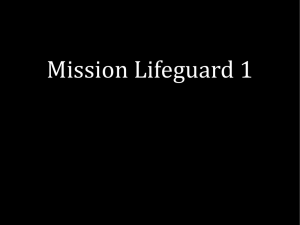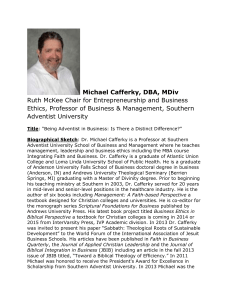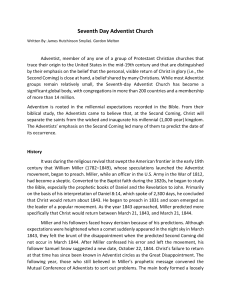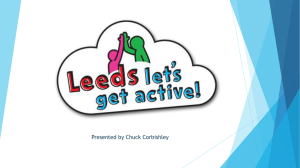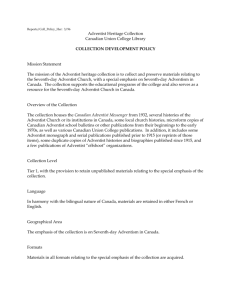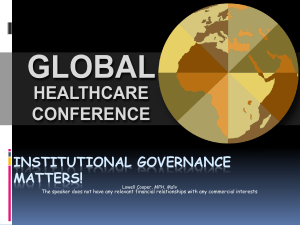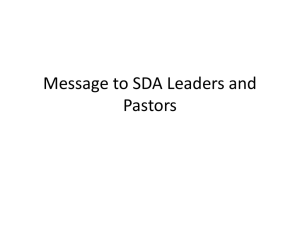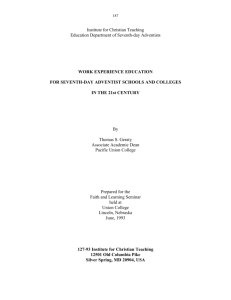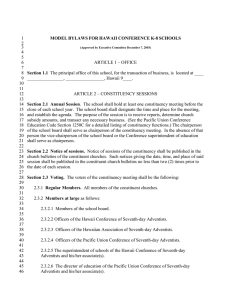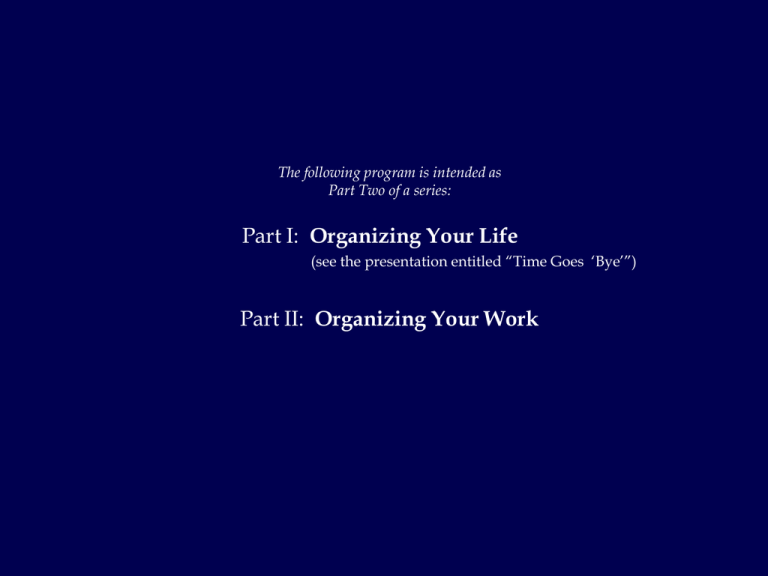
The following program is intended as
Part Two of a series:
Part I: Organizing Your Life
(see the presentation entitled “Time Goes ‘Bye’”)
Part II: Organizing Your Work
Copyright 2010 by the General Conference of Seventh-day Adventists®. All rights reserved. The
information is provided for training purposes only and is not intended nor should it be used as legal
counsel. This program may not be used or reformulated for any commercial purposes; neither shall it
be published by any person or agency other than an official organizational unit of the Seventh-day
Adventist® Church, unless prior written authorization is obtained from the General Conference of
Seventh-day Adventists® Office of Global Leadership Development. Subject to the foregoing terms,
unlimited permission to copy or use this program is hereby granted upon inclusion of the copyright
notice above. “Seventh-day Adventist” and “Adventist” are registered trademarks of the General
Conference of Seventh-day Adventists® and may not be used by non-Seventh-day Adventist entities
without prior written authorization from the General Conference. Use of all or any part of this
program constitutes acceptance by the User of these terms.
2
General Conference of Seventh-day Adventists
Office of Global Leadership
Prepared by: Lowell C Cooper
February 2010
Identify a defining purpose
Create balance
Expand your energy
Leverage your time
Control your schedule
4
1.
Articulate mission, vision, values
1.
Articulate mission, vision, values
Mission
Defines fundamental purpose
Vision
Defines future state
Values
Defines culture and priorities
1.
2.
Articulate mission, vision, values
Build trust
High trust produces speed.
Low trust slows everything.
Low trust creates:
Hidden agendas
Politics
Interpersonal conflict
Departmental rivalries
Win-lose thinking
Defensive and protective communication
1.
2.
3.
Articulate mission, vision, values
Build trust
Empower others
1.
2.
3.
Articulate mission, vision, values
Build trust—the focus of this presentation
Empower others
“You can have all the facts and figures, all the
supporting evidence, all the endorsement that you
want, but if you don’t command trust, you won’t
get anywhere.”
—Naill Fitzgerald, Former Chairman, Unilever
“A humble person is more concerned
about what is right than about being right,
about acting on good ideas than having the
ideas,
about embracing new truth than defending
outdated position,
about building the team than exalting self,
about recognizing contribution than being
recognized for making it.”
—Stephen M R Covey, The Speed of Trust
Speed happens when people . . . truly trust each other. —
Edward Marshall
If you’re not fast, you’re dead. — Jack Welch
Technique and technology are important, but adding
trust is the issue of the decade.
— Tom Peters, Business Author
The moment there is suspicion about a person’s
motives, everything he does becomes tainted.
— Mahatma Gandhi
You don’t need to look far to realize that, as a global
society, we have a crisis of trust on our hands.
Consider recent newspaper headlines:
“Employees’ New Motto: Trust No One”
“Companies Urge to Rebuild Trust”
“Both Sides Betray the Other’s Trust”
“20 NYSE Traders Indicted”
“Ethics Must Be Strengthened to Rebuild People’s Trust”
“Relationships Fall Apart as Trust Dwindles”
“Now Who Do You Trust?”
On the organizational level, trust within
companies has also sharply declined. Just look
at what the research shows:
Only
51% of employees have trust and confidence in
senior management.
Only
36% of employees believe their leaders act with
honesty and integrity.
Over
the past 12 months, 76% of employees have
observed illegal or unethical conduct on the job —
conduct which, if exposed, would seriously violate the
public trust.
What about trust at the individual level? Consider
the percentage of students who acknowledged
that they cheated in order to improve their
odds of getting into graduate school.
Liberal arts students – 43%
Educational students – 52%
Medical students – 63%
Law students – 63%
Business students – 75%
Trust always affects two outcomes — speed and
cost. When trust goes down, speed will also go
down and costs will go up.
When trust goes up, speed will also go up and
costs will go down.
Trust is a function of two things: character and
competence.
Character includes your integrity, your motive,
your intent with people.
Competence includes your capabilities, yours skills,
your results, your track record.
Therefore, since it is by God's mercy that we are
engaged in this ministry, we do not lose heart. We have
renounced the shameful things that one hides; we refuse
to practice cunning or to falsify God's word; but by the
open statement of the truth we commend ourselves to
the conscience of everyone in the sight of God.
—2 Corinthians 4:1-2
“We try to live in such a way that no one will ever be
offended or kept back from finding the Lord by the way
we act, so that no one can find fault with us and blame
it on the Lord.”
–2 Corinthians 6:3
“Having spent many years trying to define the
essentials of trust, I arrived a the position that if two
people could say two things to each other and mean
them, then there was the basis for real trust. The two
things were ‘I mean you no harm’ and ‘I seek your
greatest good.’”
—Jim Meehan, British Psychologist and Poet
Abraham Lincoln is a legendary example of
someone who could inspire trust in others —
even in his former rivals. Basically,
his communication was straight
and simple. Even though people
disagreed with him, he did not
appear duplicitous. Lincoln said,
“If I were two-faced, would I be
wearing this one?“
What upsets me is not that you lied to me,
but that I can no longer believe you.
– Friedrich Nietzsche
Christianity: “Do unto others as you would have them do unto you.”
Judaism: “What you hate, do not do to anyone.”
Islam: “No one of you is a believer until he loves for his brother what
he loves for himself.”
Hinduism: “Do nothing to thy neighbor which thou wouldst not have
him do to thee.”
Buddhism: “Hurst not others with that which pains thyself.”
Sikhism: “Treat others as you would be treated yourself.”
Confucianism: “What you do not want done to yourself, do not do to
others.”
Aristotle: “We should behave to our friends as we wish our friend
behave to us.”
Plato: “May I do to others as I would that they should do unto me.”
For some people, becoming a leader can be a real power
trip. They relish the feeling of control over both
people and information. And so they keep secrets,
reveal little of their thinking about people and their
performance, and hoard what they know about the
business and its future. This kind of behavior
certainly establishes the leader as boss, but it drains
trust right out of a team.
— Jack Welch
“Tell the truth in a way people can verify. Get real
and genuine. Be open and authentic. Err on the
side of disclosure. Operate on the premise of
“What you see is what you get.” Don’t have
hidden agendas. Don’t hide information.”
— Covey
“The counterfeit of transparency is illusion. It’s
pretending, “seeming” rather than “being,”
making things appear different than they really
are.”
— Covey
The internet is a prime example of counterfeit
because people can hide their identity and
provide seemingly true information.
Without knowing the truth, Oprah defended author
James Frey against the accusations that he
embellished “nonfiction” incidents written in his
book. Because of this, she had damaged her
reputation. She said ”I made a mistake and I left the
impression that truth does not matter, and I am deeply
sorry about that. That is not what I believe. To
everyone who has challenged me on this issue of truth,
you are absolutely right.”
Watergate wasn’t so much a burglary as it was the
failure to recognize mistakes, to take responsibility
for them, and to apologize accordingly.
— Jon Huntsman, Chairman, Huntsman Chemical
Leaders also establish trust by giving credit where
credit is due. They never score off their own people
by stealing an idea and claiming it as their own.
— Jack Welch
Give credit freely. Acknowledge the contributions
of others. Speak about people as if they were
present. Represent others who aren’t there to
speak for themselves. Don’t bad-mouth others
behind their backs. Don’t disclose others’
private information.
We judge ourselves by what we feel capable of doing,
while others judge us by what we have already done.
— Henry Wadsworth Longfellow
The illiterate of the 21st century will not be those who
cannot read and write but those who cannot learn,
unlearn, and relearn.
— Alvin Toffler
One of the reasons people stop learning is that they
become less and less willing to risk failure.
— John Gardner, Author of Excellence and Self-Renewal
Anyone who stops learning is old, whether this
happens at twenty or eighty. Anyone who keeps on
learning not only remains young, but becomes
constantly more valuable regardless of physical
capacity.
— Harvey Ullman
You learn nothing from your successes except to think
too much of yourself. It is from failure that all
growth comes, provided you can recognize it, admit
it, learn from it, rise above it, and then try again.
— Dee Hock, Founder and Former CEO, Visa International
Leaders need to be more candid with those they purport
to lead. Sharing good news is easy. When it comes to
the more troublesome negative news, be candid and
take responsibility. Don’t withhold unpleasant
possibilities and don’t pass off bad news to
subordinates to deliver. Level with employees about
problems in a timely fashion.
— Jon Huntsman, Chairman, Huntsman Chemical
Almost all conflict is a result of violated expectations.
— Blaine Lee, Author of The Power Principle
One way of checking to see if your communication
has been clears is to “check for clarity” by asking
a few simple questions:
What have you understood from this conversation?
2. As a result of our interaction, what do you see as your next
steps? What do you see as mine?
3. Do you feel that others are clear regarding expectations?
4. What can we do to make things more clear?
1.
All power is a trust; and we are accountable for its
exercise.
— Benjamin Disraeli
Hold yourself accountable.
Hold others accountable.
Leadership has less to do with walking in front and
leading the way than it does with listening to the
needs of people of the company and meeting them.
— Charles M. Cawley, Chairman and CEO, MBNA America
It is a leader’s responsibility to demonstrate what is
means to keep your word and earn a reputation for
trustworthiness.
— Hank Paulson, Chairman and CEO, Goldman Sachs
Leadership without mutual trust is a contradiction in
terms.
— Warren Bennis, Author of On Becoming a Leader
TRUST BUILDERS
1.
2.
3.
4.
5.
6.
7.
8.
9.
10.
11.
12.
13.
Tell the truth
Demonstrate respect
Create transparency
Right wrongs
Show loyalty
Deliver results
Get better
Confront reality
Clarify expectations
Practice accountability
Listen first
Keep commitments
Extend trust
OUR PRACTICES
What is one thing we are
now doing that we should
continue doing?
1.
What is one thing we
are now doing that we
should stop doing?
2.
What is one thing we
are not doing that we
should start doing?
3.


